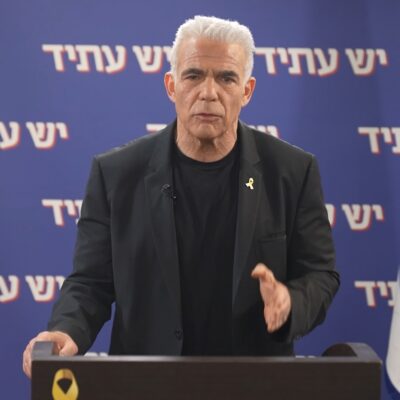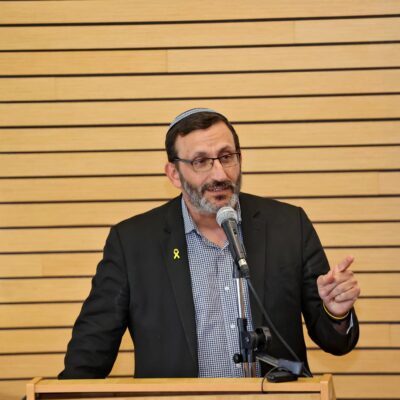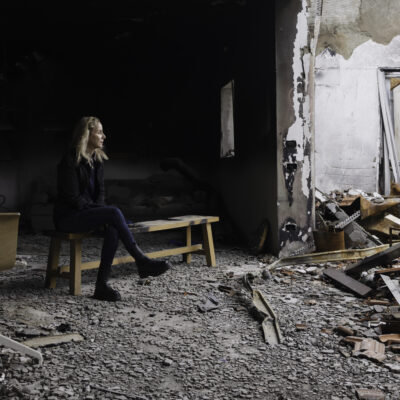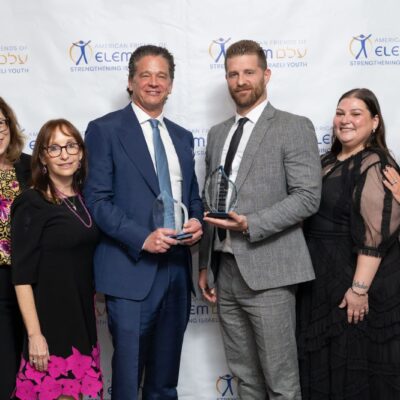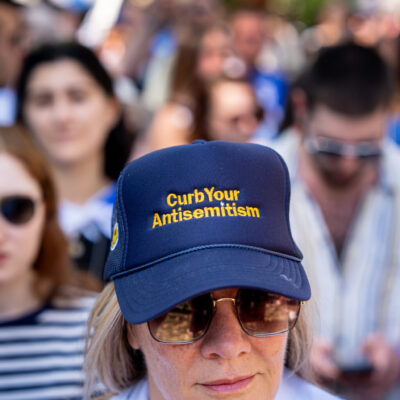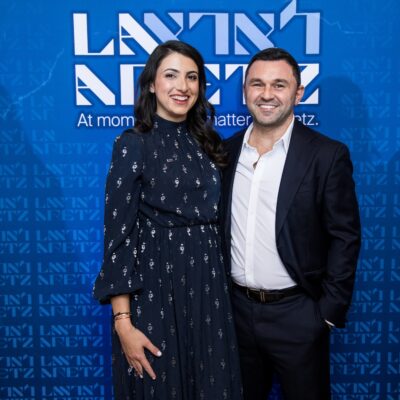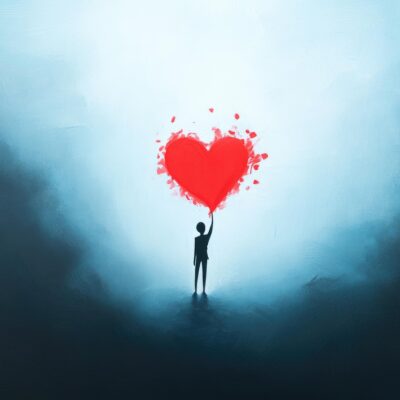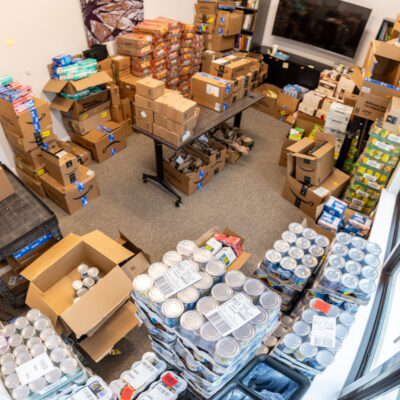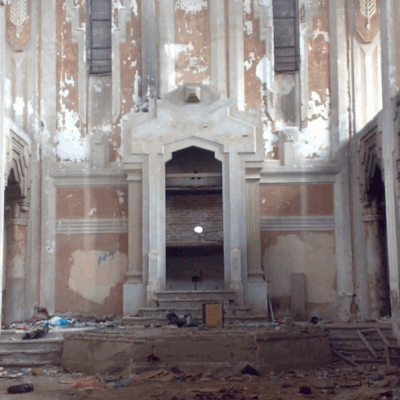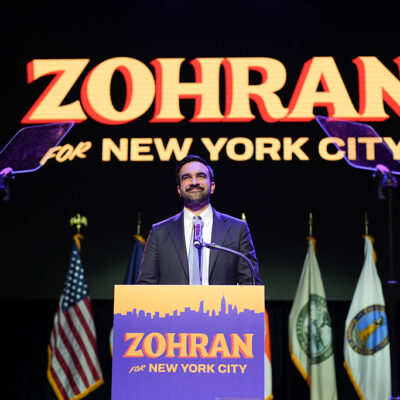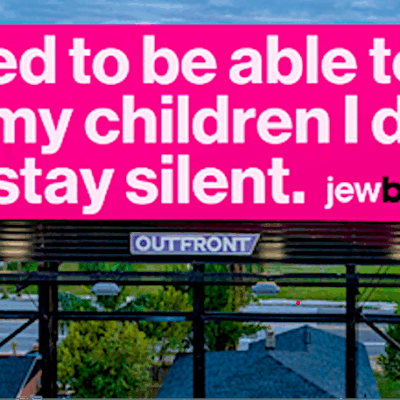Q&A
‘I’m trying to take our pain to a place of healing,’ says bereaved Rabbi Doron Perez as he eyes top WZO role
World Mizrachi chair acknowledges excesses of the National Institutions, but says they're necessary to maintain broad coalition; calls for Jewish unity

Courtesy/Yaniv Kopel
Rabbi Doron Perez, executive chairman of the Mizrachi World Movement, speaks onstage at the University of Haifa’s Ruderman Program for American Jewish Studies annual conference on April 9, 2024.
In the days after the Oct. 7 terror attacks, when his son Capt. Daniel Perez was still officially designated as missing, Rabbi Doron Perez oversaw the wedding of his other son, Yonatan, who had been wounded as he fought off the terrorist invasion of Sderot in southern Israel. Reflecting on the duality of grief and joy that the family experienced under the chuppah, Perez offered an alternative understanding of the famed third chapter of Ecclesiastes, that there is “a time to weep, and a time to laugh; a time to mourn, and a time to dance.”
“I always thought that that was different periods in your life,” Perez said, speaking to the 18Forty podcast a few months later. He realized then that the message was, in fact, “that all of these things often happen at the same time.”
For Perez, the chair of the Modern Orthodox World Mizrachi movement, the past month has been yet another time in which joy and sorrow, mourning and celebration, have collided. Three weeks ago, the remains of Daniel Perez — who was later found to have been killed during the Oct. 7 attacks as he and the tank crew that he commanded defended the Nahal Oz area — were returned to Israel under the ceasefire agreement, and a funeral was held on Oct. 15.
Less than two weeks later, at the World Zionist Congress in Jerusalem, Perez was proposed as the next chair of the World Zionist Organization under a power-sharing agreement between the center-left and center-right blocs, which collapsed hours after it was announced. As the negotiations continued, the remains of Staff Sgt. Itay Chen were returned to Israel, marking the full return of all members of Daniel Perez’s tank crew to Israel. (Sgt. Tomer Leibovitz’s remains were found soon after the Oct. 7 attacks, and Staff Sgt. Matan Angrest, who was taken hostage alive, was released on Oct. 13.)
And after extended coalition talks, Perez is now expected to serve as the next president of the WZO, a largely ceremonial role, but one that will offer him a chance to represent the global Zionist community, not only the religious communities that he has until now led as World Mizrachi chair.
Perez spoke with eJewishPhilanthropy last night to discuss his personal and professional whiplash, and the unity that he believes the Zionist movement and the Jewish People need to focus on moving forward.
The interview has been lightly edited for clarity.
Judah Ari Gross: I want to speak with you about two topics. One is about the release of Staff Sgt. Itay Chen, and the other is about all of the mishegos related to the World Zionist Congress. They seem like somewhat distinct topics. Let’s start with the World Zionist Congress, and then we can speak about “Perez Crew.” Where do things stand in the negotiations from Mizrachi’s point of view? Obviously, Yesh Atid threw everyone a curveball this week.
Rabbi Doron Perez: Last Wednesday evening, half an hour before the end of the congress, after weeks and days of negotiations, we were then within a hair’s breadth of signing agreements. We had a literal 50-50 agreement, which, I think, is very, very fair.
The leadership of Keren Kayemeth LeIsrael-Jewish National Fund will be split — two and a half years, two and a half years — the leadership of the WZO would be split — two and a half years, two and a half years. Even though it’s not great to split leadership positions — you ideally want to bring in the right person for five years — but this way we could have genuine power sharing. That way everybody could feel that it was a genuine wall-to-wall agreement, which is in the DNA of the National Institutions. (Ed. note: The agreement was not entirely “wall-to-wall,” as it excluded representatives of the far-right Otzma Yehudit party, with whom the center-left bloc had vowed not to share power.)
We were within a hair’s breadth of the signing, and then the bombshell came [the proposed appointment of Israeli Prime Minister Benjamin Netanyahu’s divisive son, Yair]. I could not understand why this was used as an opportunity to scuttle and break weeks and days of negotiating. If the issue was over this or that candidate, we could have had a vote. The person could have been not accepted democratically.
It didn’t make sense, which made me feel that what’s going on here is not actual institution politics, but deeper things in Israeli politics. The sense I’ve got is that the National Institutions have got caught up in internal Israeli politics.
Now I’m not here to judge this side or that side because my personal opinion is irrelevant. It doesn’t matter if I think this side is overreaching or that side is overreacting. To me, the issue is that the National Institutions have become collateral damage of internal Israeli politics.
I think the system has lost when an agreement, which was so close to being signed after so much negotiation, got unraveled because of one particular person. So now we have to try and go back as much as possible to that original agreement. That’s where we are at the moment. Yesh Atid’s decision [to drop out of the National Institutions] hasn’t really changed things. I think there will still be an agreement between left and right, with me supposed to be president of the WZO. I was originally going to be chairman, now it’s the president.
Either way, the role that I see in this is to bring an [arrangement] that we can all agree on. It’s in no one’s interest to fight. We have to put Israeli politics aside and find a way so that the fissures and divisions within Israeli politics don’t become overly dominant in the National Institutions, because those who would suffer for it are Diaspora Jewry, and I’m a person who comes from a Diaspora community.
We can’t afford to have fighting within the World Zionist Organization when we have such challenges in Israel and for Jewish communities around the world.
JAG: I hear what you are saying, but if your goal is to minimize infighting and minimize the influence of domestic Israeli politics in the National Institutions, Yair Netanyahu, who is one of the most divisive figures in Israeli politics, would make that nearly impossible. Setting aside the claims of nepotism, this is a person who has been found guilty multiple times of libel and defamation against his political opponents.
DP: I don’t believe that the issue has anything to do with Yair Netanyahu anymore.
JAG: At this stage, perhaps not, but in my conversations with figures from the center-left bloc, it seems as though the issue is not only with Netanyahu specifically but that proposing a person like him shows a lack of seriousness and appreciation for an institution like the WZO. People who are anyway wary of the National Institutions see something like that and it only confirms their beliefs that they are being used for corruption and cronyism.
DP: It’s difficult for me now to start checking the validity and appropriateness of everything and every individual. I think you go down a track and it becomes very subjective. What I would say is that I believe that it could have been dealt with on its own. It could have been voted out on its own, and there could have been a democratic vote. It didn’t have to unravel the whole agreement.
JAG: But again, the issue is not necessarily only with that one person — though he is particularly divisive — but with the system that is increasingly seen as bloated, as a cash cow, as a mechanism for corruption and cronyism. Say what you will about Yesh Atid’s decision to drop out of the WZO over this view, but that is the view.
DP: I can’t really comment on the inner workings of Yesh Atid and their motivations. They were in a very strong position, so I’m not sure why they chose to pull out. But I can say that I do agree that the challenge we have in many institutions, including the WZO and KKL, is that they can be viewed, by some, as an opportunity to provide jobs and positions. You could make an argument that the leadership of the WZO is bloated more than it should be.
I do want to say, though, that the same argument could be made about the government of Israel, and even when [Yesh Atid] was in power, there were lots of promises to bring down the amount of ministers, and they struggled to do it. Because when you have to govern and when you’ve got a coalition that you’ve got to bring together, it’s not so easy.
So do I agree with you that this is something that you have to try and transform as much as possible? That we have to ensure that the National institutions are not just providing leadership positions and salaries for people but rather are serving the constituents of the World Zionist Congress? Absolutely. I think there’s work to do there. But I don’t believe that it’s different from the government and many public institutions, where they seem to be top-heavy because the people at the top are trying to keep coalition partners to have time to govern. It’s not so easy. It’s not so easy.
It’s easy to criticise from the outside, but remember that the World Zionist Organization is arguably the most diverse Jewish organization in the world. You have from the ultra-right and ultra-Orthodox to the ultra-liberal streams. You’ve got people sitting around the table from almost 50 countries, from Israel, America and all the other countries around the world. And it’s not that you get 51% of the vote and then you run everything. Here, it’s a different model.
JAG: So we really can keep talking about the World Zionist Congress all day because I find it fascinating and important, but I want to hit pause on that and speak about “Perez Crew.”
DP: So let me say one more thing, and maybe this is a good segue to the second topic.
I feel very deeply that after Oct. 7, what Israel and the Jews need is healing, not blame. We know who’s to blame. The left wing is absolutely convinced that it’s [Prime Minister Netanyahu] and the government. The right is convinced that it’s Shin Bet security service and the army. And the truth is somewhere in the middle. We need to just conclude the divisiveness that we had before Oct. 7. We know how divisive Israel was until Oct.7. We saw the division over the judicial reform.
We can have the same argument over and over. To me, it’s less important who’s right or wrong. What’s more important is “Can we get our act together?”
I made a comment at Daniel’s grave, and it’s a comment that I’ve been going with the whole time: Israel may be the smallest nation in the world, but it’s the biggest family in the world.
To me, that explains why we prepared to bring every single hostage, dead and alive. I don’t think any other country would do it. And why? It’s because we’re mishpucha. If you heard how Matan Angrest spoke at our son Daniel’s funeral, he said Daniel will be my commander for life. After two years underground, he came out from wherever he was and came to speak to Daniel. He just felt he had to. And one of the things he said was that he would go back into Gaza in order to bring out Itay Chen, whose burial is on Sunday. Look at the camaraderie.
How else do you explain that over 100,000 people came back to Israel in the beginning of the war? And I’ve heard stories from Goa, India, that there were thousands of Israelis and thousands of Russians and Ukrainians. And the Russians and Ukrainians couldn’t understand, after they had done everything to get away from their war, the Israelis are running to go to theirs.
So after Oct. 7, I don’t care if you’re for or against the judicial reform. I don’t care what part of the political spectrum you’re on. I don’t care, by the way, if you’re Jewish. Twenty-one Bedouins were killed on Oct. 7, many of them trying to save people.
This is a wake-up call for us to get ourselves together. The National Institutions are supposed to be a platform of unity for the Jewish People. We have to get our act together.
If you look at these four boys [from Daniel Perez’ tank crew], they were from all walks of life. They all had each other’s backs. They fought for each other. They fought so heroically. I heard from the former general of the IDF Southern Command, [Maj. Gen.] Yaron Finkelman, who said to me that having read all the reports fro Oct. 7, if “Tank Perez” didn’t fight the way that it did, there could have been hundreds, if not thousands, more dead. Why? Because it was set exactly at the entrance to Kibbutz Nahal Oz. So only 15 people were killed out of 450 people. It was hit much less than other kibbutzim, like Kfar Aza. They made such an impact. And this tank is a microcosm of the Jewish family — religious, secular, from the cities, from the periphery.
There are still six people in captivity in Gaza. There’s still one combat officer, Hadar Goldin. What his parents have been through for 11 1/2 years is just unimaginable. And there are another five civilians.
Today I was at the funeral for Oz Daniel, and tomorrow is the funeral for Omer Neutra. Daniel was very close to Omer Neutra. They were together in officers’ course. We’ve got videos of them together.
And then on Sunday, we’ve got Itay Chen’s funeral. Three funerals, one after the other.
I hope that spirit of camaraderie will be taken into civilian life, into the National Institutions, into public life, into politics. That’s my open prayer. So for me, it’s all connected.
I’m trying to take our personal pain to a place of healing, of togetherness. I think that’s what the Jewish People need. I’ve learned a lot from Daniel, I’ve heard a lot from his friends, I’ve learned a lot from all these families, how we can really be in this together, put all the differences aside and try and do something better for the Jewish People.
JAG: Thank you for sharing that. The captives were such a strong force for bringing the international Jewish community together, particularly the ones with dual nationalities, like Omer Neutra, who became such a symbol within the Conservative movement, and Itay Chen and your son, Daniel. Thank God, the hostages have returned or are returning home now, but how do you propose maintaining that cohesion and unity?
DP: One of the tremendous things that has come out over these last two years is you could see what an incredible people we are. Oz Daniel’s father, Amir Daniel, said today that so many people have contacted him from all around the world, literally feeling like he was their child as well. All of us in the hostage families have felt the embrace of the Jewish People, both in Israel and around the world.
This tragedy connected all of us. We all, unfortunately, feel a bit more vulnerable, both in Israel and around the world. I think our opportunity and our duty is to capitalize on that. I think it was Rahm Emanuel who said “Never let a serious crisis go to waste.”
This is a terrible crisis, but in a crisis, there is an opportunity. We’ve revealed not only who this younger generation [of Israelis who defended the country] is, but how we care about each other and how much Diaspora Jews have rallied for Israel. This is an opportunity to rediscover our family, and that is what we are. We’re one family.
It’s almost like we’ve rediscovered our siblings, rediscovered our family members. Now you have to spend more time together to deepen the relationships. And I think that is our challenge today. I think it’s doable because I think the bonds are solid.
JAG: I wonder how your message would be taken within Israel’s religious Zionist community. You say “I don’t care if you’re Jewish,” but there are people in the religious Zionist community who are trying to change the Law of Return to make it more difficult for people who are not Jewish to immigrate.
DP: To me, the focus is how do we bring as many Jews as possible into the Zionist movement, how do we make them feel a connection to Judaism and Zionism. That’s the call of the hour. And if they’re Reform Jews, then I’d like them to be Reform Jews who are as Zionistic as possible. And the same if they are Haredi Jews.
The World Zionist Organization doesn’t have to make controversial decisions. It doesn’t decide who is a Jew. It doesn’t make decisions on sovereignty. It doesn’t make decisions on conversion. It doesn’t make decisions on the Haredi enlistment use. That’s not its jurisdiction. Its jurisdiction is to connect Jews all around the world to the State of Israel and to Zionism. That’s the DNA of the movement, that’s what we have to focus on.
I find, sometimes, that people get confused. They fight battles that are not the battle of this particular movement. Those battles can be fought elsewhere.
Right now, in the Jewish world, the focus should be on ahavat Yisrael [love within the Jewish People]. Who’s right and wrong is less important. The relationship itself is more important than who’s right or wrong. In a marriage or in a family, does it matter who’s right or wrong? Between husband and wife, does it matter who’s right or wrong? What matters most is, can the family stay together?

 Add EJP on Google
Add EJP on Google